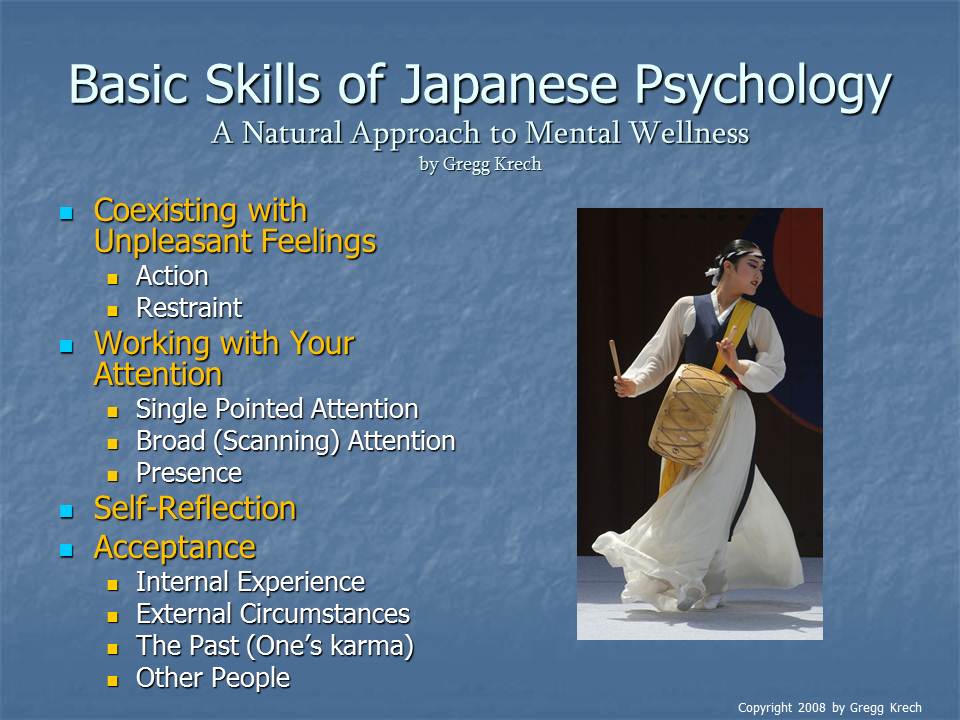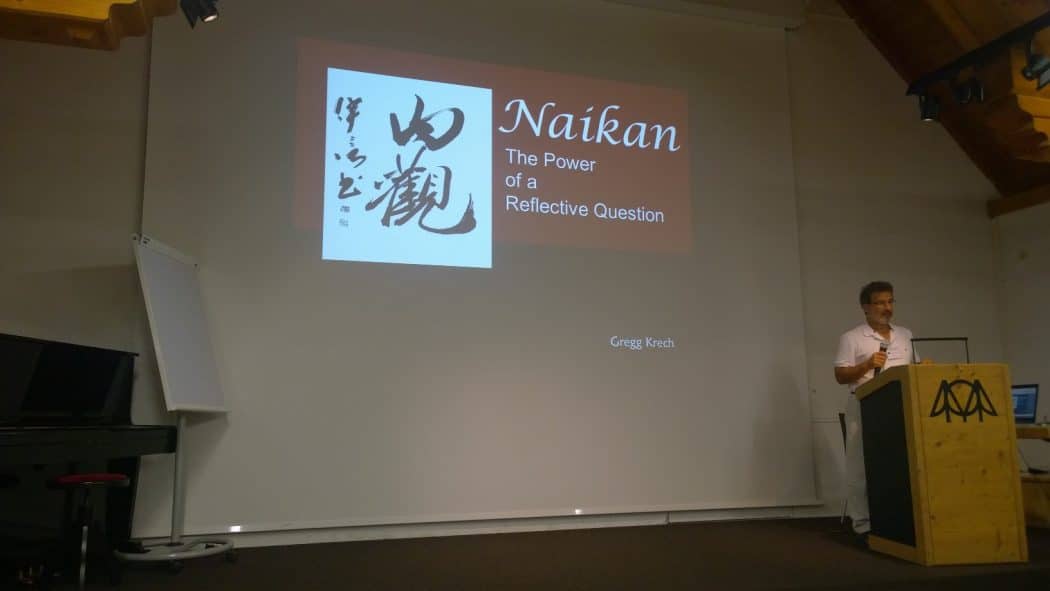by Gregg Krech
Many of us read a lot of books that provide wise advice about how to live. But when we encounter challenges that push us to the edge, we find it difficult to put that advice into practice. Reading doesn’t help us live better, it just gives us information and ideas. To integrate those ideas into our lives, we have to practice. A Natural Approach to Mental Wellness identifies four skills that are the foundation of Japanese Psychology:
1. Acceptance. “Arugamama” is a Japanese term that means “to accept things as they are”. In such a state of acceptance, there is no energy caught up in resistance and struggle. Many of us struggle to control what cannot be controlled. Acceptance is a skill that allows us to relax into a situation that is challenging, rather than trying to control and manipulate external conditions.
2. Coexisting with Unpleasant Feelings. We have a fairly limited cultural understanding about how to deal with feelings. We tend to consider only two options – either to express them or to repress them. But the other option is to coexist with them, to accept them and take them with us as we do what we need to do in our lives. This skill is the key to taking action and accomplishing the things which are important and meaningful to us, even when we don’t feel like it.
3. Attention. The theme of attention runs through both Morita Therapy and Naikan. One of the most distinctive characteristics of Japanese Psychology is the discovery that self-focused attention is associated with psychological and emotional suffering. So instead of constantly focusing on our internal experience, we learn to shift our attention in a way that helps us engage with the world around us.
4. Self-Reflection. We all have a story (actually many stories) that explain our unique lives and relationships with others. The practice of Naikan self-reflection gives us a chance to challenge the validity of our stories. A sincere examination of ourselves takes both courage and wisdom. But it allows us to abandon the view of ourselves as a victim and helps us develop a deep sense of appreciation for life and how we’ve been cared for and supported.
How Do You Use the Four Mental Wellness Skills?
The vast majority of psychological and emotional problems create suffering for us because we do not possess the skills required to address the challenges life places before us. In other words, mental wellness is not based on insight, self-awareness or some sort of individual deficiency. Mental wellness is based on our skill level.
Let me give you an example. I know a woman in her early seventies who is depressed and unhappy. She has faced some great challenges in the past several years including the ending of a long term relationship and a diagnosis of breast cancer. She has also experienced a decline in her general mobility and ability to handle the requirements of daily living. Part of her suffering is caused by her inability to genuinely accept the reality of her situation at this point in her life. She consistently talks about the past and recalls how much better off she was many years ago. She hasn’t found a way to accept the circumstances of her life now, so she can move forward. (Acceptance). In essence, she fights against reality – and that’s a fight that you can never win.
Like most of us, she can get by fairly well when things are going well. It’s when things fall apart that we’re forced to find our resilience and strength as we’re stretched beyond our edge.
This woman (we’ll call her Claire) feels a great deal of sadness in her heart and anxiety in her mind. For much of her adult life, she has allowed her feelings to dictate her behavior. If she felt good, she was active and doing the things she needed to do. But when she was depressed, or anxious, she would respond to those feelings by withdrawing and taking very little action – even actions which could influence her situation for the better. She has very little capacity to coexist with her feelings of discomfort (Coexisting with Unpleasant Feelings).
In addition, Claire’s mind is completely preoccupied with her own feelings, thoughts and circumstances. She puts very little energy into focusing on the problems or joy of others. She may ask someone how they are doing, but the conversation quickly turns back to her own discontent and pain. Her personality is characterized by a heightened degree of Self-Focused Attention. The more she focuses her attention on herself, the more she suffers.
Finally, Claire focuses primarily on how other people are causing her problems, either by what they do or what they don’t do (“my brother is never there for me”). She rarely pays attention to how people are helping her or supporting her. If she took time to reflect on her relationships, she might see that even as challenges have appeared, other people have stepped in to help her with everything from driving to getting medical treatment. Without the capacity to reflect on herself (Self-Reflection), her attitude is dominated by the troubles others cause her, and she rarely considers that what she is doing may be causing problems for others.
Claire’s situation is sad and also somewhat extreme. She lacks the skill to face the crisis that has appeared in her life. Like most of us, she can get by fairly well when things are going well. It’s when things fall apart that we’re forced to find our resilience and strength as we’re stretched beyond our edge.
How can we practice these skills so that when we’re faced with significant challenges we can rise to the occasion instead of being knocked to the ground? Five years ago I designed a 30 distance learning course in which I teach these skills and provide daily exercises for people to practice and become more skillful. I teach this course once a year, in September, and I invite you to join me this year. The course, A Natural Approach to Mental Wellness, includes a copy of my book, by the same name, and is sponsored by the ToDo Institute. This year’s program starts on September 16, 2014. You can find out more here, or contact the ToDo Institute at todo@todoinstitute.com












